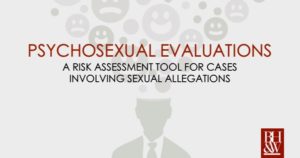 A psychosexual evaluation is a method utilized by courts, prosecutors, and defense attorneys to provide a scientific basis to determine with a person is likely to be a repeat sexual offender. The evaluation is performed by a state-licensed mental health professional and, if requested by the defense, it is completely confidential for the client and their attorney.
A psychosexual evaluation is a method utilized by courts, prosecutors, and defense attorneys to provide a scientific basis to determine with a person is likely to be a repeat sexual offender. The evaluation is performed by a state-licensed mental health professional and, if requested by the defense, it is completely confidential for the client and their attorney.
Psychosexual evaluations are routinely performed to:
- Identify deviant sexual behavior patterns
- Evaluate the risk level of sexual and non-sexual recidivism
- Recommend the type of treatment options that will be most beneficial to the client
- Identify specific risk factors that should be targeted during treatment
Explaining the Psychosexual Evaluation Process
How long does the evaluation last?
The evaluation usually lasts a full day, but can sometimes spill over into a second day. However, the entire evaluation can be completed in about six hours. A typical schedule for the evaluation will last from 8:30am – 5:00pm, with breaks between sections of tests.
The Evaluation Consists of Four Parts
- Clinical interview
- Psychometric tests
- Physiological assessment of sexual arousal
- Risk assessment
Clinical Interview
The clinical interview lasts about one hour and serves to help the therapist and the client get to know each other before the tests begin. It also gives the client an opportunity to talk about the allegation with the therapist. This is the point where the therapist will document their initial impressions and provide detailed notes on the client. It is important that the person is honest and open about the nature of the allegation. If conducted at the request of the individual’s attorney, the evaluation is covered under the attorney-client privilege and the attorney cannot disclose the results or what was said without the client’s permission.
Psychometric Tests
The psychometric tests are comprised of a personality inventory, sexual inventory, and intelligence test. These tests are primarily in written formats, including true or false questions. The personality inventory allows the therapist to evaluate the client’s personality type, which will be factored in throughout the assessment. The sexual inventory is the longest portion, consisting of about 560 items. It is a thorough assessment of the client’s sexual history, background, and development. Again, this portion of the test factors into the therapist’s overall assessment of the client’s situation. The final portion is the intelligence test. This portion only lasts about twenty minutes and is essentially an IQ test. The intelligence test is important because it allows the therapist to effectively advocate that the client can handle the mental demands of treatment.
Physiological Assessment of Sexual Arousal
The physiological assessment helps the therapist understand whether the allegation would be outlier behavior for the client or not. This is primarily achieved by gaining an understanding of the client’s sexual preferences using the penile plethysmograph (PPG). The PPG operates by measuring blood pressure and erectile changes in the penis of the client due to the introduction of different visual stimuli. The PPG also monitors the client’s breathing to determine whether they’re attempting to deliberately falsify the results. Because accurate results are required for the therapist to make a strong evaluation on behalf of the client, the client should not attempt to cheat the PPG. Due to the nature of the visual stimuli and the physical intrusiveness of the PPG, this is considered the most difficult part of the evaluation for individuals being tested.
Rarely, a polygraph will also be performed. The polygraph is only used when the client denies any actual physical contact because the chance of recidivism is greatly diminished if there is no physical contact. If the polygraph is failed, then the results will not be used in the therapist’s evaluation because they do not indicate anything significant about the client’s situation.
Risk Assessment
The risk assessment consists of two parts, general criminality and sexual recidivism. The general criminality portion determines the client’s risk of recommitting crimes, while the sexual recidivism portion determines the client’s risk of recommitting sexual crimes. This part of the psychosexual assessment is extremely important because it allows the therapist to assign the client a risk profile to reoffend, both in general criminality and in sexual criminality. The therapist’s testimony that the client is a low risk to reoffend can be crucial for the defense in asserting that the client does not deserve a harsh punishment for the original allegation.
Confidentiality
When the psychosexual evaluation is obtained as part of the defense case preparation, it is completely confidential. Only the client and his attorney will be provided with it. Neither the client’s spouse nor any government entity can see the evaluation, unless it is used in court, and the defense attorney will only use the evaluation in court if it is beneficial to the client’s case. The evaluation is occasionally used at trial, but it is more often used during the plea-bargaining stage to improve the client’s case or during a sentencing portion of a trial.
Advice for Clients and Attorneys Regarding Psychosexual Evaluations
Clients should be honest with the therapist because it allows for a more reliable and accurate evaluation, which will be more beneficial to the client’s case. If the client lies or attempts to cheat the tests, the therapist will not be able to provide a good evaluation and may not be able to testify as well on behalf of the client.
Attorneys should provide information the therapist regarding the charges being made against the client (within the limits of discovery laws). Not only does this allow the therapist to factor that into the evaluation, but it also bolsters their testimony in court as they have accounted for the charges and facts of the case already. The stronger and more complete the therapist’s evaluation, the more likely that it will stand up in court against tough cross-examination.










